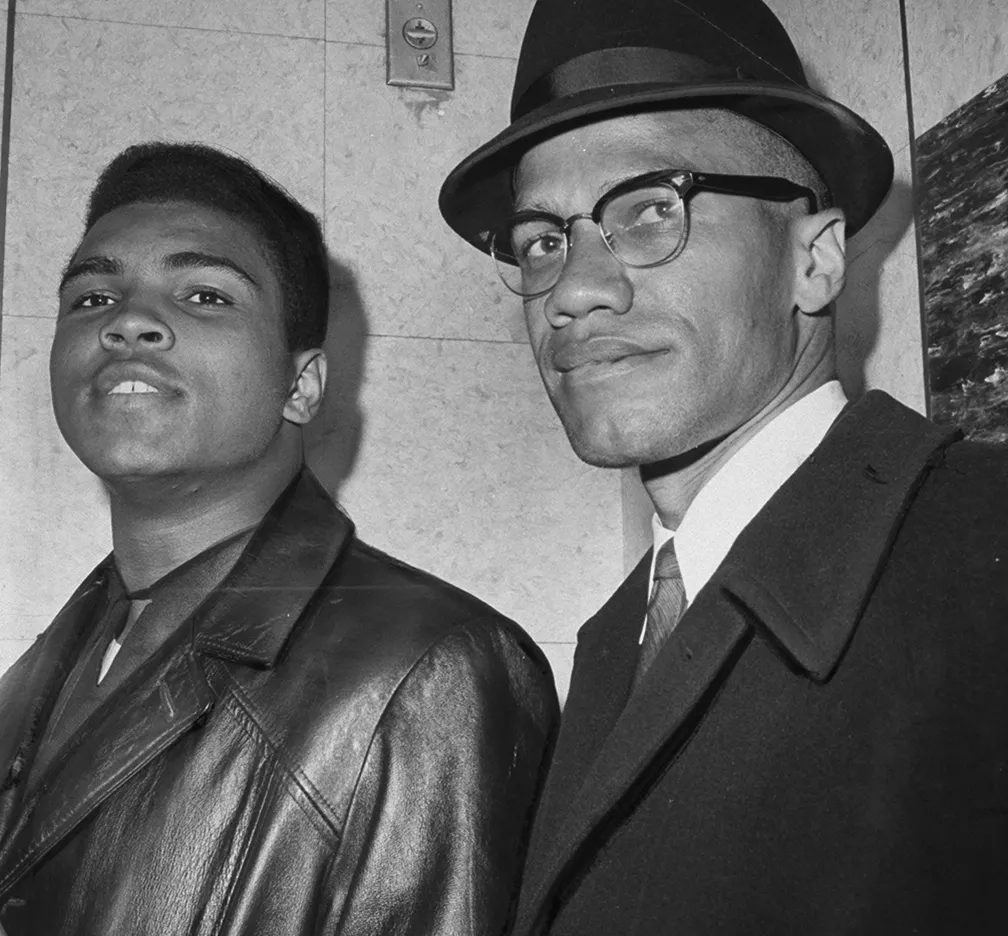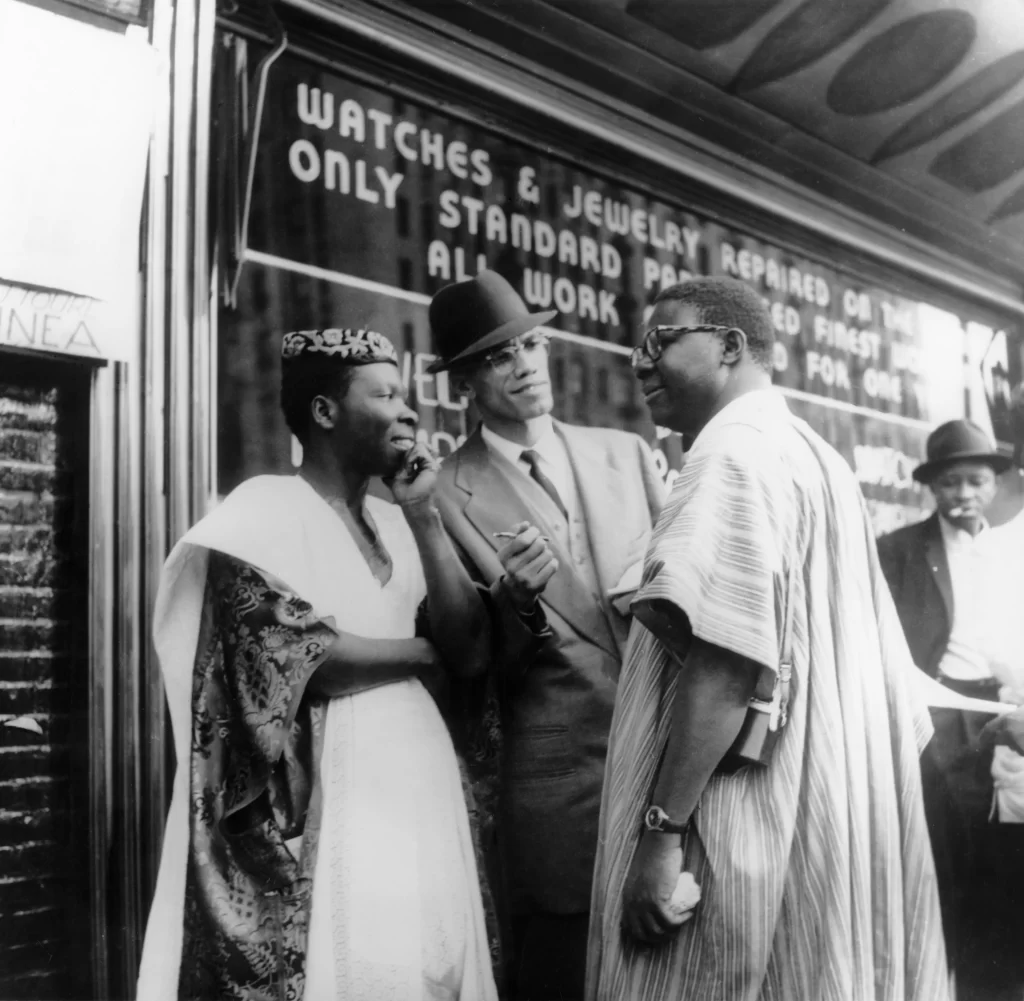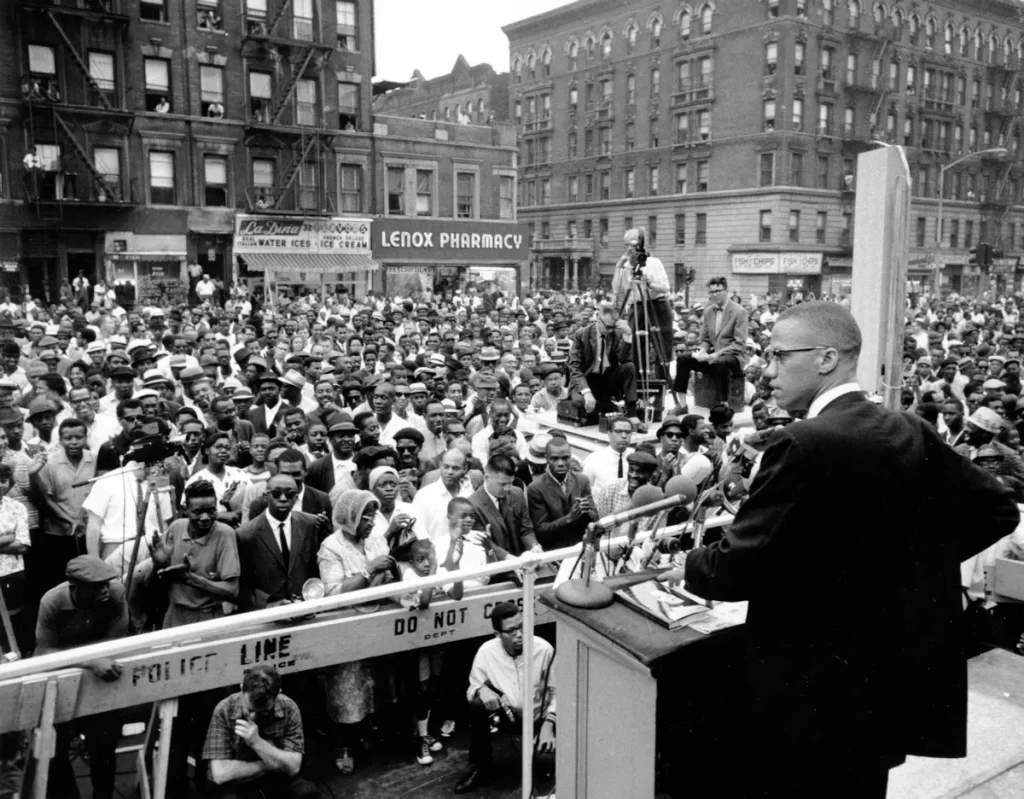Thanks to significant efforts to suppress his message, most of us do not realize how deeply impactful Malcolm X’s legacy has been to the US and the world. Before he was assassinated in 1965, Malcolm laid the blueprint for the Black radical movements, economic empowerment strategies, and political consciousness that continue to shape global Black life today. His influence wasn’t about anti-whiteness—it was about global Liberation, from within. His radical confrontations with white supremacy forced the U.S. government to respond, catalyzing policies that even today impact our ability to move freely, to express our identities, and to demand justice.
Here are 10 things we wouldn’t have if not for Malcolm X:
1. The Black Panther Party and the Fight for Free Social Programs
Without Malcolm X’s radical critique of America’s treatment of Black people, the Black Panther Party (BPP) might have never emerged. The Panthers were deeply influenced by Malcolm’s belief in self-defense, self-determination, and community control. Their legacy includes free breakfast programs, health clinics, legal aid, and the push for educational reform—things that still benefit Black communities and many working class Americans today. In fact, the Panthers’ Free Breakfast for Children Program forced the federal government to implement free school meals nationwide, something that Black Gen Z and Gen Alpha benefit from daily.
2. Integration
Many people conclude that integration was the work of Martin Luther King Jr. and peaceful protests alone. But what made the government move was the growing influence of radical voices like Malcolm X, who made it clear that Black people were running out of patience. His international advocacy and calls for Black independence alarmed the U.S. government, which feared a global embarrassment. Without Malcolm’s militant presence, it is likely that civil rights reforms—including school desegregation, voting rights, and fair housing—would have been even slower or nonexistent.

3. An Ideal Model for Black Economic Empowerment
Malcolm X constantly preached the importance of Black economic power—owning businesses, supporting Black institutions, and pooling resources. His teachings inspired generations of Black entrepreneurs and led to the development of economic strategies that still impact Black businesses today. Concepts like cooperative economics (Ujamaa in Kwanzaa) and “Buy Black” movements owe much to Malcolm’s vision. His insistence on Black self-sufficiency paved the way for the continual rise of Black business districts, financial literacy initiatives, and institutions like the National Black Chamber of Commerce.
4. An Effective Blueprint for Black Internationalism
Before Malcolm X, most Black political thought in America was still rooted in a U.S.-centric framework. Malcolm shifted the national conversation to global Black liberation, connecting the struggle of African Americans to decolonization movements in Africa, Asia, and the Caribbean. Today, Black Gen Z benefits from this internationalist view, which fuels movements like #EndSARS, the fight for Palestinian liberation, and global discussions on reparations.

5. The Expansion of Islam in Black America
While the Nation of Islam existed before Malcolm X, he made it a national force. His visibility and later shift to Sunni Islam helped establish a foundation for the strong presence of Islam in Black communities today. From hip-hop artists to everyday Black Muslims, Malcolm X’s impact made Islam a permanent part of Black American culture. Without his influence, the spread of Islam as a faith of Black resistance and empowerment would be much weaker.
6. The Concept of ‘By Any Means Necessary’
Malcolm X is the reason more Black people stopped asking for freedom and started taking it. His philosophy of self-defense and refusal to beg for justice inspired movements like the Black Panther Party and continues to shape militant Black organizations today. Groups such as the Malcolm X Grassroots Movement, the National African American Gun Association (NAAGA), and Burkina Faso’s current leadership under President Ibrahim Traoré, which has emphasized African sovereignty and self-defense against neocolonial influence, all reflect Malcolm’s enduring legacy. The phrase “By Any Means Necessary” has become a guiding principle for radical activism, reminding Gen Z that Black freedom is not something we wait for—it’s something we take.
7. Media Representation of Black Militancy

Before Malcolm X, mainstream media only depicted Black activism in terms of nonviolence. He introduced an unapologetic image of Black resistance that disrupted these narratives. Today, when we see radical, outspoken Black voices in politics, hip-hop, and social media, we are witnessing Malcolm X’s legacy. Figures like Assata Shakur, Fred Hampton Jr., Amanda Seales and others have continued the tradition of speaking truth to power without apology.
8. Reparations at Center Stage
Malcolm X was one of the first major leaders to push the idea that the U.S. owed Black people reparations for slavery, Jim Crow, and ongoing economic oppression. He reframed the conversation from one of civil rights to human rights, which forced international attention on America’s anti-Black policies. Today’s discussions around reparations, from California to Ghana to Brixton, owe a direct debt to Malcolm X’s framing of the issue.
9. The Radicalization of Black Youth Movements
The language of modern youth-led movements—from Ferguson to today’s campus protests—echoes Malcolm X’s teachings. His emphasis on youth leadership and unfiltered truth influenced the Student Nonviolent Coordinating Committee (SNCC) and later radical groups. Many young Black activists today—whether they know it or not—are moving in the spirit of Malcolm X when they demand justice unapologetically.
10. The Power of Unapologetic Black Identity
Before Malcolm X, terms like “Negro” were widely accepted. He redefined Black identity by embracing Afrocentric names, natural hair, and pride in African heritage. His rejection of white standards of beauty and culture set the stage for the Black Power movement and, later, cultural shifts like hip-hop, natural hair movements, and Afro-futurism. Today, Black Gen Z embraces their cultural roots in ways that would have been unthinkable before Malcolm’s time.
Malcolm X: The Catalyst for Black Power
Malcolm X was not just an activist—he was a catalyst. He forced America to confront the full reality of Black oppression and pushed the conversation beyond simple integration. His radical critique of white supremacy and emphasis on Black autonomy changed the trajectory of Black life in America, influencing policies, movements, and ideologies that continue to shape Black Gen Z today.
If you’ve ever eaten a free school meal, called yourself “Black” with pride, demanded justice for an unarmed Black person, or seen a radical Black activist on TV—you’ve felt Malcolm X’s impact. His sacrifice was not in vain, and his legacy is alive every time Black people assert their power, by any means necessary.
Here is the most comprehensive article we could find on Malcolm’s most important legacy, his six daughters.
What are we missing? What else would we not have if not for Malcolm X? Tell us in the comments below.
Join us at the Shabazz Center this Friday for the 60th annual memorial of the assassination of our Shining Black Prince, Malcolm X–in this year of the Malcolm Centennial.
Bibliography
- Breitman, George. Malcolm X Speaks: Selected Speeches and Statements. Pathfinder Press, 1990.
- Carson, Clayborne. In Struggle: SNCC and the Black Awakening of the 1960s. Harvard University Press, 1981.
- Joseph, Peniel E. The Sword and the Shield: The Revolutionary Lives of Malcolm X and Martin Luther King Jr. Basic Books, 2020.
- Marable, Manning. Malcolm X: A Life of Reinvention. Viking, 2011.
- Rickford, Russell J. We Are an African People: Independent Education, Black Power, and the Radical Imagination. Oxford University Press, 2016.
- Tyson, Timothy B. The Blood of Emmett Till. Simon & Schuster, 2017.
- Umoja, Akinyele Omowale. We Will Shoot Back: Armed Resistance in the Mississippi Freedom Movement. NYU Press, 2013.
- Woodard, Komozi. A Nation Within a Nation: Amiri Baraka (LeRoi Jones) and Black Power Politics. University of North Carolina Press, 1999.
